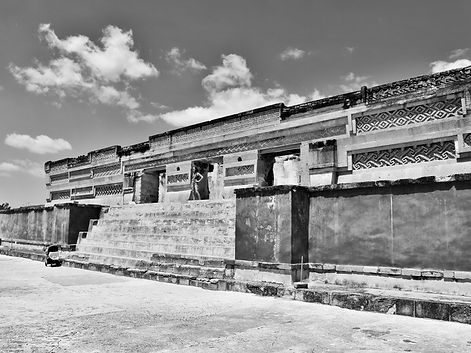The ARX Project
Archaeology Research and Exploration
They were endowed with intelligence, they succeeded in knowing all that there is in the world…And they contemplated in turn the arc of heaven and the round face of the earth."
[Popol Vuh, III, Ch. 2]
ABOUT US
The ARX Project was launched in 2020 with the goal to provide a multidisciplinary approach to the study of the ancient past. We work in partnership with governmental and non-governmental institutions to advance our knowledge of human history and the origins of civilization.
We are a Mexico based non profit organization that is sustained through the work and passion of our associates, as well as through the generosity and contributions of our sponsors, both public and private.
We constantly welcome new Team members to join in and collaborate on our projects and expeditions. Please, send us your CV or a short personal profile and we will be in touch.
SUPPORT THE ARX PROJECT
_edited.jpg)
As a non-profit organization, we rely on donations and sponsorships, as well as on the work and contributions of our Associates, to support our activities.
In addition to the the direct and immediate costs of organizing and coordinating research expeditions and conservation efforts on the ground, even a small non-profit organization such as ours faces significant expenses to keep our projects running. These include the cost of administration and accounting, tax liabilities, web-hosting fees and subscriptions, as well as many of the day-to-day expenses required to keep the lights on. Much of these costs are covered directly by our Associates, who are all volounteers and do this out of a sincere commitment to the mission and vision of the ARX Project, and do not include the countless hours spent working on projects aside from our own day-to-day jobs and our families.
This is why WE NEED YOUR HELP, whether in the form of direct support and participation in our projects, or through your generous donations.
If you believe like us in the importance of independent research to address the many enigmas of the ancient past and uncovering the origins of civilization, you can donate to the ARX Project either through Paypal or by becoming a patron on Patreon, following the links below.

PROJECTS
Each one of our projects is aimed at expanding our knowledge of ancient societies and generate new data on the origin and development of civilization.
We promote a multidisciplinary approach to the study of our past, bringing together experts from different fields such as archaeologists, geologists, architects and speleologists for the exploration and documentation of archaeological sites.
Our expeditions are conducted in the utmost respect of local regulations and cultural sensitivities, combining on-the-ground exploration with the use of non-invasive exploration and investigation techniques like LiDAR, drones, satellite imagery and ground penetrating radar.

Mesoamerican Origins
The question of the origin of Mesoamerican civilization is one that has intrigued generations of archaeologists, culture historians and anthropologists. The Olmecs, which flourished between 2,500 and 400 BC, have been long considered the earliest major civilization of Mesoamerica, expressing one of the first widespread artistic and cultural traditions in parts of what is today Mexico and Guatemala.
Since the early 1990’s, however, a new hypothesis has emerged that Mesoamerican civilization did not arise in isolation, but as part of a complex network of regional trade interactions that favored cultural exchange and the diffusion of similar artistic styles as well as pottery, stone and metalworking techniques across a wide area between western Mexico, Central and South America.
These contacts certainly took advantage of the extensive river network of ancient Mexico and Guatemala, particularly along the Balsas and Usumacinta rivers, where some of the earliest centers of Mesoamerican civilization outside of the Gulf coast of Mexico may be found.
By taking a Pan-American view of the development of civilization in the Americas, our mission is to document the complex mosaic of cultural influences that shaped the formative and classic period of Mesoamerican civilization.
Our methods combine traditional exploration with the use of the latest technologies in aerial and satellite imaging to help unravel the great puzzle of Mesoamerican origins, mapping and documenting the trade corridors and original centers of civilization of the Americas.
We believe that modern archaeological research can benefit from a multidisciplinary approach drawing from such diverse fields as archaeology, geology, geophysics, astronomy, history, climatology and comparative mythology.
We are convinced of the potential of new technologies such as remote sensing, geophysical methods, chemical and genetic analysis to deepen our understanding of the remote past, for which we provide external support and funding.
We have a vision for the ARX Project to become a recognized force in the search for the origins of civilization through field research, publications, conferences and documentaries, and welcome both recognized scholars and independent researchers.

THE TEAM
Our Team consists of experts from different disciplines including archaeologists, geophysicists, speleologists, architects, engineers, photographers and digital artists.

ARTICLES AND NEWS
In this section we will be publishing updates from our projects and important news relevant to our fields of study.
July 23, 2024
MITLA,OAXACA
Project Lyobaa
Project Lyobaa - Revealing the secrets of the Mitla Underworld
In september 2023, the second phase of Project Lyobaa revealed an even more extensive network of subterranean chambers and tunnels under the archaeological site of Mitla, Oaxaca. These latest findings, obtained with the use of geophysical methods, confirm the ancient legends and colonial accounts that speak of a lost subterranean labyrinth under the site, considered by the ancient Zapotecs to be an entrance to the Underworld, or Lyobaa.
Learn about the findings of the second season of Project Lyobaa



_JPG.jpg)


_edited.jpg)
_edited.jpg)









_edited.jpg)